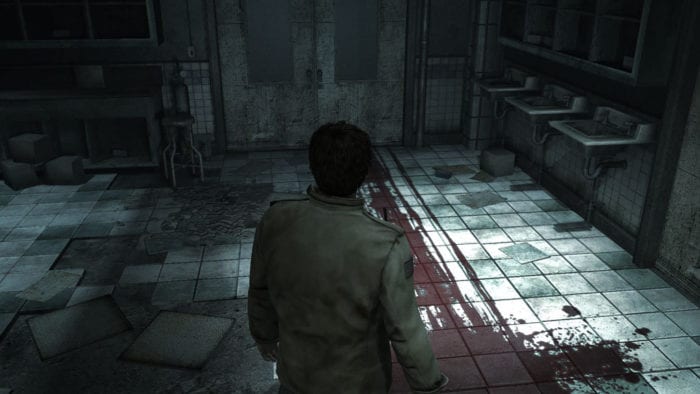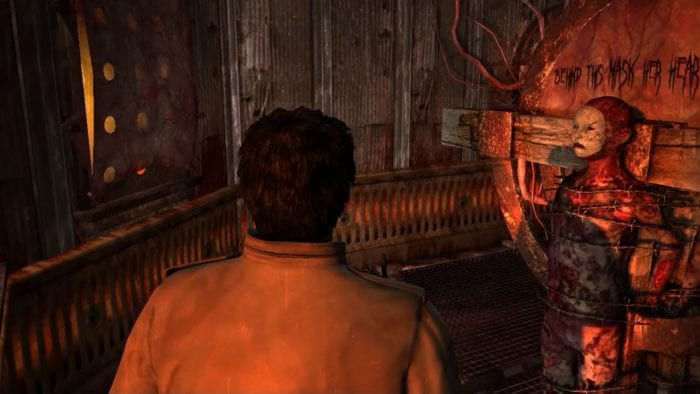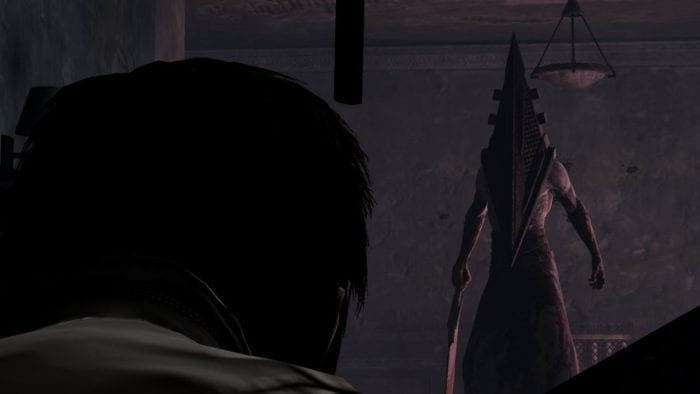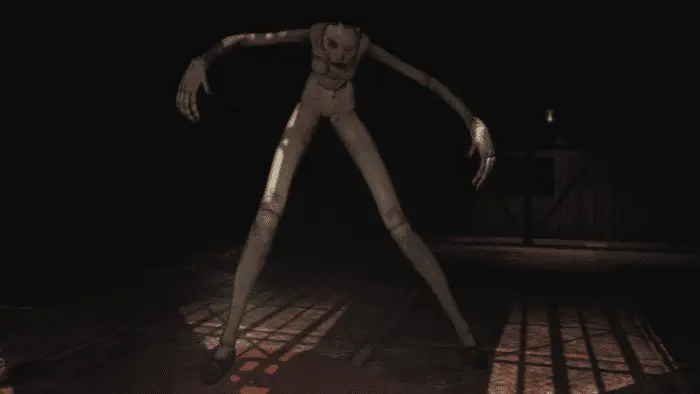Few series are as revered in the horror community as Silent Hill, which is kind of odd when you think about it. It depends on who you ask, but some might say there are only three good games in the whole franchise, or maybe even two depending on how picky they are. I’m of the mindset that there are several quality titles in it, although even those vary by quality. Regardless, most can agree that once Team Silent stopped producing the games, their quality dipped pretty significantly. What were once harrowing, emotional horror stories turned into shock fests that relied on familiar imagery over real narrative weight. Unlike some, however, I do think there’s still merit in some of these later titles, and today I’d like to discuss Silent Hill: Homecoming. To me, it’s a kind of fascinating title, as for everything it does right, it does just as many things wrong. Before we continue, I will be discussing full spoilers for the game’s story.

One of the big warning signs to fans is that in this game, you’re not necessarily a regular person. Instead, players step into the shoes of Alex Shepherd, who is (you guessed it) coming home to Shepherd’s Glen to find that everything has become rather foggy—literally. The classic fog that envelopes Silent Hill has crossed over into Shepherd’s Glen, and with that comes a whole host of otherworldly problems to face. Rather than being greeted as a hero with open arms, Alex returns to find his mother in a catatonic state, who will only say that his father has gone to find his missing brother Josh. Alex sets out to find both of them, and contends with the nasty residents that have made Shepherd’s Glen their home.
It’s not a terribly original setup. It seems that all of the later entries in the series(including the overlooked Shattered Memories) have aped the first game’s setup of looking for a missing loved one in the hellish town. Each one had varying degrees of success (Silent Hill 2 is, to this day, still a masterpiece of video game storytelling, while Shattered Memories used the familiar setting and characters to weave an oddly touching and sad tale of the relationship between parents and their kids) with this, and Homecoming arguably does it the worst. Not only does it feel trapped in the shadow of the better entries of the series, but it repeats those beloved games’ bigger mistakes.
As Alex continues on through town, fighting his way through hordes of monsters with the game’s renewed focus on combat since he supposedly fought overseas, he discovers some pretty startling truths. The first, and perhaps most unsurprising one, is that Shepherd’s Glen is a neighboring town to Silent Hill, and because of that, the religious cult The Order, who drove Alessa Gillespie to madness in the first game and inadvertently caused all of the supernatural shenanigans that go on in the town, has a sect in this place, too. Why the cult split is kind of unclear, but what does soon come to light is that this group believes in a different god, and their attempt to appease the god is directly tied to the missing children all around town.
The game shows flashes of the series past; Alex has a strained relationship with Elle, who, like him, is looking for a missing sibling and is a child of one of the town’s founding families. Some of the monsters are pretty damn sexual in design, implying he has some frustrations with Elle and his troubled history with her. The thick fog is spooky as always, and some of the later levels really feel like a return to the glory days of the series. The problem is that the story tries to hit similar beats to the greats but fundamentally misunderstands what made the early games so beloved.
It doesn’t take a genius to figure out what’s really going on with Alex and Shepherd’s Glen, especially once you find out that the missing children of the founding families were a part of a ritual. In one of the darkest twists I’ve seen in a mainstream horror title, each family sacrifices their firstborn child in a very, very specific way to appease the unseen god of the town. And while these deaths are never directly seen, the implications the game makes are pretty damn scary (we’ll come back to how the game represents the children in a bit). So, with all this knowledge, what do you think happened with Alex?

Chances are, even if you haven’t played the game, you’ve figured out that Alex accidentally killed Josh a while ago. Because of course he did. James Sunderland killed his wife in the second game, so that must mean the same twist should work a second time, right? The difference, of course, is that every single element of Silent Hill 2 is personal to James exclusively. Hell, there are heavy implications throughout that game’s events that imply the other characters you meet in town are seeing an entirely different version of it. We come to learn more about James and his wife, Mary, by exploring the town, and by the end, you don’t want the terrible truth to be real. But it is, no matter what you do. It’s what gives that game a sense of tragedy and what makes it so damn good.
Alex, on the other hand, feels superficial, and we don’t ever really learn much about his relationship with Josh or his family beyond it being strained. It makes the revelation that Alex killed Josh in a boating accident kind of a misfire. You don’t really feel attached to Alex in any particular way by the end. There’s little that makes him relatable or likable, unlike Harry Mason, James Sunderland, or Heather Mason from the third entry. And not only that, but the game takes this and moves it a step further by revealing that Alex never went to war at all, but instead went to a mental hospital. So his combat prowess makes absolutely no sense whatsoever. It feels like a missed opportunity to tell a different story of trauma and anguish, and instead, the game focuses on the series’ overarching lore.
I hold that the third game is just as good as the second, but even I’ll admit that the game’s plot relies too heavily on the literal story and background of the town. Part of what makes the second game so good is that you really don’t need to know anything about its history to appreciate the personal journey James embarks on. He and his late wife used to spend their anniversaries in Silent Hill, so Silent Hill is where he goes through a personal hell of his own making. The town is important to the story, but the reason behind the fog, the monsters, everything doesn’t really matter because the game isn’t about that. In Homecoming, the game is very much about the history and lore of the series, often to a fault.
Perhaps the most egregious mistake the game makes is aping imagery from the original live-action movie. I think that movie is better than some say, but even I’ll admit that it fundamentally misunderstood what makes the games so good, and that’s never clearer than in the appearance of Pyramid Head. Pyramid Head is a representation of James Sunderland’s own tortured mind, his self-hatred for what he did to his wife personified. Pyramid Head is such a specific symbol to James that his appearance in the movie and Homecoming makes no sense whatsoever. Oh, sure, there’s a note in one of the later entries that vaguely refers to PH as a “red god,” an executioner of sorts that punishes the wicked. Ignoring how that totally undermines James’s own personal journey in the second game, it just feels cheap when Homecoming pulls the beloved geometric character out of nowhere for a few story beats. This is to say nothing of how the Otherworld, where the game’s many nightmare sequences take place, looks like they jumped right out of the movie, complete with rustic hallways and scenery that peels itself away. Again, that aesthetic worked for the stories of the first game and the movie since it was reflective of Alessa’s suffering and righteous fury. It doesn’t make a whole lot of sense to have it in Alex’s personal journey, especially when water is more emblematic of his guilt since he killed Josh in a boating accident.

I’ve spent quite a bit of time discussing how Homecoming tries and fails to understand what made the original few games in the series so great, but here’s the weird thing: I don’t hate it at all. In fact, I generally like Homecoming, in all its flawed glory, and I think it’s because it hits quite a few high notes that are worth noting. For one, even though the story is a muddled mess with some seriously dark parts, the game does an outstanding job at making you understand the dead children’s plight through its boss battles. There is only a handful of them in the game, but each one is extremely memorable thanks to its outstanding design and simply haunting atmosphere. The first one, called Sepulcher, is representative of Joey, a missing boy who was buried alive. As such, his fight is a gigantic living tree-like monster. It’s pretty solid, but can’t hold a candle to the next two.
The second boss is an absolute doozy, with it representing the missing kid Scarlet. It takes the form of a giant, lanky doll whose porcelain skin chips away as you damage it to reveal bloody skin underneath. It’s all set in a hell of an arena, too; the room is dimly lit, with only vague outlines of walls at the corner of your vision giving you any indication of where you are. Meanwhile, an eerie choral track plays in the background. It all comes together to create a boss fight that’s instantly memorable. It’s deeply disturbing, especially when you consider the cut scene that came before it, which sees Scarlet’s father cutting himself to bleed away the sin of killing his own daughter via dismemberment. Her murder is never shown on screen, but this supremely unsettling atmosphere and fight still make you imagine what Scarlet was going through while her father killed her. It makes the game just as much the dead kids’ story as it is Alex’s.

The third fight apes The Human Centipede, and it represents Elle’s sister Margaret, who was strangled to death by her mother. In perhaps the series’ most straight-up disturbing mix of sexuality and violence, the fight against Asphyxia is just as memorable as Scarlet, with a haunting song playing as you put down this perverse amalgamation of naked bodies. It feels kind of superficial that Alex ultimately defeats the monster by removing its hands from its mouth, letting it breathe, and undoing Margaret’s death, but like Scarlet, the boss is so disturbing in nature that the player is able to feel a mixture of pity and revulsion in a way few horror games would dare attempt.
The game’s final boss is against a creature known as Amnion, a pregnant woman who has giant mechanical spider legs. This fight represents Josh, who took Alex’s place as sacrifice and whose death kickstarted the game’s events. Like the others, the outstanding creature design sticks in the brain, and the way Alex defeats it is perhaps even more disturbing; he cuts its pregnant belly open, spilling Josh out onto the ground. I can’t think of a game that is willing to go so far to disturb the player, and to me, it succeeds. The overall plot of the game may be pretty weak, but these boss fights personify the suffering of the story’s missing characters in a way that really affected me when I first played the game and still does to this day.
There are some other good parts, too. The overall monster design is rather strong, with some extreme perverseness thrown in for good measure. The first third of the game is a slog through town, with dull environments and streets, but it makes up for it in the back half with some really creative and unique environments. And certainly not least of all, Akira Yamaoka was firing on all cylinders when he created the game’s soundtrack. It’s tough to say where it ranks with the rest of the series since all of them except Downpour have outstanding music, but Homecoming has some of my favorite lyrical tracks in the whole series, from beautiful piano pieces to disturbing rock. If the rest of the game were as good as the soundtrack, Homecoming would likely be a certified horror classic.
As it is, Homecoming was something of a catalyst for the downfall of the rest of the series. There’s plenty to like in it, and it has some replay value thanks to its multiple endings (including the ever-present joke UFO ending). The boss fights are incredibly well done, calling to mind the series earlier hits, and its soundtrack is as good as any of the other entries. That being said, it’s difficult to shake the feeling while playing it that it’s simply aping what came before rather than expanding on it, and certain elements flat out make no sense. Its ties to the series lore, and how sacred it holds that lore, is ultimately a huge detriment. The reason the second game is so beloved is that it took the framework and setting of the original and took it in an entirely different, much more intimate direction. And even though some decry the third game, I think its unique perspective of a young teenage girl lends it a lot of merit when it comes to exploring some seriously disturbing themes. Silent Hill: Homecoming is aesthetically pleasing, and has some real nasty surprises up its sleeve. I just wish it could have gone the extra step and really forged its own path instead of relying on what came before.


